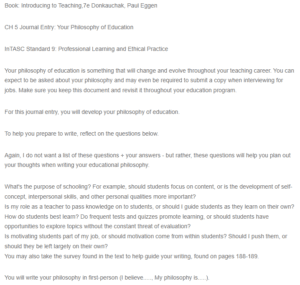Education Philosophy
I believe there is more to education than merely learning, doing some exams, and getting assessed to determine the best and worst performers. As such, my education philosophy is that learning should be holistic, which basically means educating the children wholly and going beyond the core academics. Mahmoudi et al. state that holistic instruction incorporates an extensive range of philosophical orientations and pedagogical undertakings (Mahmoudi et al. 178). Also, holistic education tends to appreciate the strengths of all learners (Sutarman et al.). Typically, the approach concentrates on wholeness and tries to evade omitting any vital human experience elements. As a result, instructors ought to address the learners’ academic, ethical, social, and emotional necessities in an assimilated learning design. Learners necessitate more than just a sturdy foundation in a central curriculum. In addition, they require community support to develop a sympathetic comprehension of the surrounding world.
Are you interested in obtaining a unique copy of the ” Education Philosophy “ ? Get in touch with us.
I believe that one of the most significant components of the education approach is enabling the learners to think for themselves. Accordingly, motivation skill is something that all teachers should possess. When teachers step into a class, the first thing they should do is inspire the learners, and this brings the difference. Inspiring students means creating a better future where people have self-drive. Once learners believe in themselves, they develop the drive to learn; thus, good performance comes easily. Even later in life, this belief is transferred to their jobs, families, relationships, and other life aspects. This conviction comes from the fact that I performed poorly in school until one teacher believed that I could do better against all odds. He motivated and encouraged me, and through this, I changed my self-perception from a very negative to a positive one. He kept telling me that I was intelligent and could do better until one day, I believed I could, which transformed my score from poor to average and later to one of the best performers. Similarly, I would like to do the same for other kids and make them believe in their potential. I want to help every child see themselves as capable and develop intrinsic motivation toward learning.
Once learners believe in themselves, it is easy for them to study on their own. As such, the tutor should merely be a guide directing them as they explore varying subjects. This helps them to maintain knowledge rather than depend on rote memory. In evaluating the comprehension of content, giving frequent tests is vital as it helps identify the areas that require emphasis. Notably, formative evaluations are crucial as they help assess student learning, thus providing continuing feedback that teachers can utilize to improve teaching. Additionally, the learners become accustomed to quizzes, thus minimizing the fear of tests.
Accordingly, I intend to have a positive attitude and high anticipation toward my students. I will focus on seeing the best in my students rather than concentrate on the worst student’s work. Besides, learners tend to show high motivation in classes once tutors exhibit high anticipation, utilize multidimensional teaching approaches, and hold an open-atmosphere classroom (Sedden and Kevin 609). Inspiring and motivating the learners are my major principles in teaching, and with these standards, I will help my learners to believe in themselves. I think that all learners can be bright when presented in an appropriate learning environment. I will be patient and compassionate with my learners since I know other factors, such as family conditions, could impact their learning. All learners can be intelligent despite any existing conditions; therefore, it is the instructor’s role to instill this belief in them. Overall, I intend to be the hope that every student is seeking.
Works Cited
Mahmoudi, Sirous, et al. “Holistic education: An approach for 21 century.” International Education Studies 5.2 (2012): 178-186.
Sedden, Mandy L., and Kevin R. Clark. “Motivating students in the 21st century.” Radiologic Technology 87.6 (2016): 609-616.
Sutarman, Sutarman, Heru Kurnianto Tjahjono, and Tasman Hamami. “The implementation of holistic education in Muhammadiyah’s Madrasah Indonesia.” Dinamika Ilmu (2017): 191-203.
ORDER A PLAGIARISM-FREE PAPER HERE
We’ll write everything from scratch
Question 

Education Philosophy
Book: Introducing to Teaching,7e Donkauchak, Paul Eggen
CH 5 Journal Entry: Your Philosophy of Education
InTASC Standard 9: Professional Learning and Ethical Practice
Your philosophy of education is something that will change and evolve throughout your teaching career. You can expect to be asked about your philosophy and may even be required to submit a copy when interviewing for jobs. Make sure you keep this document and revisit it throughout your education program.
For this journal entry, you will develop your philosophy of education.
To help you prepare to write, reflect on the questions below.
Again, I do not want a list of these questions + your answers – but rather, these questions will help you plan out your thoughts when writing your educational philosophy.
What’s the purpose of schooling? For example, should students focus on content, or is the development of self-concept, interpersonal skills, and other personal qualities more important?
Is my role as a teacher to pass knowledge on to students, or should I guide students as they learn on their own?
How do students best learn? Do frequent tests and quizzes promote learning, or should students have opportunities to explore topics without the constant threat of evaluation?
Is motivating students part of my job, or should motivation come from within students? Should I push them, or should they be left largely on their own?
You may also take the survey found in the text to help guide your writing, found on pages 188-189.
You will write your philosophy in first-person (I believe….., My philosophy is…..).
